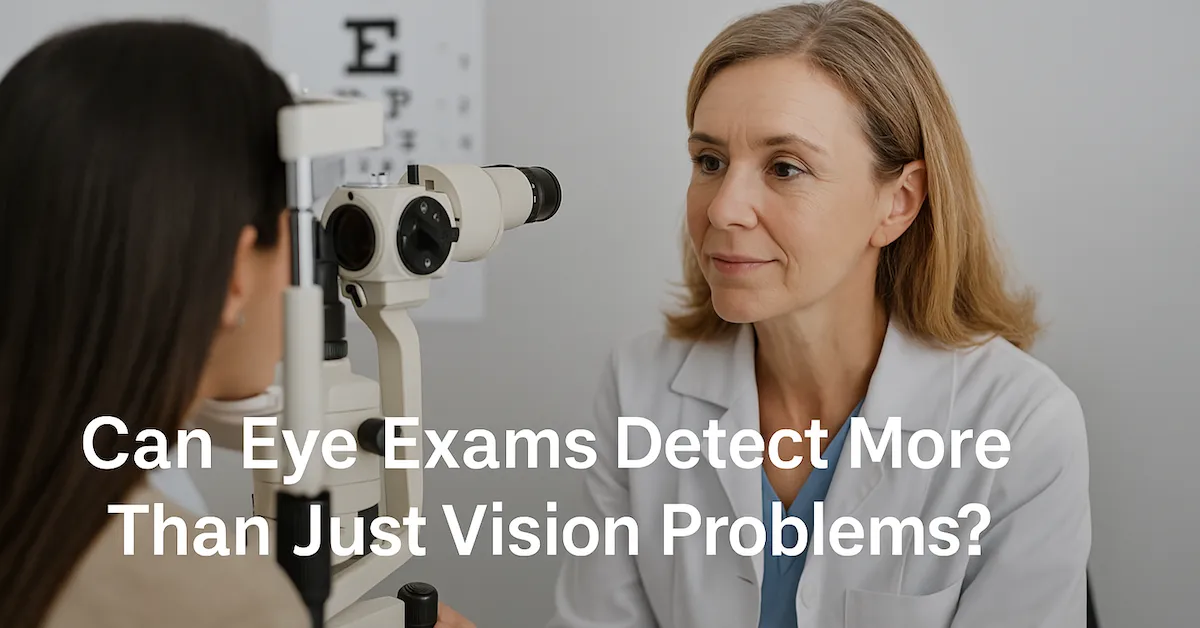
Can Eye Exams Detect More Than Just Vision Problems?
Most people think of eye exams as a way to update their glasses or contact lens prescription, but a comprehensive eye exam does far more than check how clearly you can see. Your eyes can reveal signs of serious health issues long before you notice symptoms elsewhere. That is why scheduling regular eye exams is not just about maintaining good vision but about protecting your overall health too.
The Eye as a Window to Overall Health
The eyes are one of the few places in the body where blood vessels and nerves are visible without surgery. This makes them an excellent indicator of your general health. During an eye exam, your optometrist or ophthalmologist can detect early signs of systemic diseases by observing changes in the retina, optic nerve, and blood vessels. Many conditions, including diabetes, high blood pressure, and autoimmune diseases, leave visible traces in the eyes long before they show symptoms elsewhere in the body.
Common Non-Vision Conditions Detected During Eye Exams
A thorough eye exam can detect several medical conditions that affect more than your eyesight. Some of the most common include:
Diabetes: One of the first signs of diabetes may appear as tiny blood vessel leaks or swelling in the retina. This condition, known as diabetic retinopathy, can be detected during an eye exam even before you notice changes in your vision.
Hypertension (high blood pressure): High blood pressure can cause damage to the blood vessels in the retina, leading to narrowing or bleeding. Your doctor can identify these changes and suggest follow-up care.
High cholesterol: Fatty deposits or plaques visible in the blood vessels of the eyes may indicate high cholesterol levels. These signs can also signal an increased risk of heart disease or stroke.
Autoimmune disorders: Conditions such as lupus or rheumatoid arthritis can cause inflammation in various parts of the eye. An eye exam can help identify this inflammation early on.
Neurological issues: Swelling of the optic nerve or abnormal pupil responses can be signs of neurological conditions, such as multiple sclerosis or even brain tumors.
By identifying these issues early, eye doctors can refer patients to the right specialists for treatment before complications develop.
Signs of Nutrient Deficiency or Lifestyle Issues
Your eyes also reflect your nutrition and lifestyle choices. A deficiency in vitamins A, B12, or essential fatty acids can cause dryness, irritation, or blurry vision. People who spend long hours on digital screens may also experience eye strain, redness, and fatigue due to poor blinking habits and reduced moisture levels.
During an exam, your eye doctor might recommend diet adjustments or supplements that support eye health, such as foods rich in omega-3 fatty acids, antioxidants, and lutein.
Mental and Neurological Health Clues
Eye exams can sometimes uncover subtle signs of mental or neurological changes. Problems with eye movement, pupil reaction, or visual field can point to issues in the brain or nervous system. For example, irregular eye movements may indicate a concussion, while changes in peripheral vision could be linked to nerve disorders. These signs often appear early, allowing for faster diagnosis and treatment.

Why Early Detection Through Eye Exams Matters
Early detection is the key to managing many diseases effectively. Since the eyes provide direct access to blood vessels and nerves, they offer a non-invasive way to monitor health conditions that may otherwise go unnoticed. By identifying changes early, doctors can help prevent vision loss and minimize complications that affect other organs.
Many patients first learn they have conditions like diabetes or high blood pressure during an eye exam. This early warning allows them to take action through lifestyle changes, medication, or ongoing medical care.
When to Schedule a Comprehensive Eye Exam
Even if you have perfect vision, regular eye exams are important. Adults should schedule an eye exam every one to two years, depending on age and risk factors. Children should have their eyes checked regularly as they grow to ensure healthy development and catch any issues early.
If you notice symptoms like frequent headaches, flashes of light, sudden vision changes, or persistent eye strain, schedule an exam as soon as possible. These signs could indicate underlying problems that require prompt attention.
Conclusion
A comprehensive eye exam is about more than just checking your vision. It is a powerful tool that can reveal early signs of serious health issues, from diabetes and high blood pressure to neurological disorders. By making routine eye exams part of your healthcare plan, you not only protect your sight but also safeguard your overall well-being.
If you are due for an exam or want to take a proactive step in maintaining your health, Bellasee provides thorough and professional eye care. Their experts use advanced diagnostic technology to detect both vision and health-related issues early, helping you see clearly and live healthier.